The Federal Government of Nigeria has been contacted by the leading global blockchain business Gluwa to promote the creation of a crypto policy framework that might help to unleash the potential of blockchain in Africa’s largest economy and open up new avenues for innovation and economic growth.
As of now, Gluwa has created the first blockchain-based credit repository, allowing financial institutions to combat fraud and credit scoring using its Creditcoin network’s trustless, on-chain, credit history verification. In addition, users may invest their USDC in a variety of international fintech lending partners over the blockchain using the multi-purpose, non-custodial Gluwa Wallet.
Gluwa Capital, the company’s venture arm, also invests in startups and has pledged $35 million to the expansion of locally owned financial service providers and cryptocurrency exchanges throughout Africa.
“We believe that cryptocurrencies have the potential to transform the financial landscape in Nigeria and across the African continent,” said Gluwa CEO Tae Oh. “By working closely with the Nigerian government, we hope to create a policy framework that encourages the responsible use of cryptocurrencies while also protecting consumers and preventing criminal activities.”
The Nigerian government hasn’t completely embraced digital assets despite a rise in crypto acceptance and use, especially among its younger population, because of worries about fraud, money laundering, and other illegal activities. According to Gluwa, digital assets may significantly contribute to Nigeria’s economic development and financial inclusion if the appropriate legislative framework is in place.
“Gluwa is committed to driving innovation and growth in the blockchain industry, and we believe that Nigeria has tremendous potential in this area,” said Tae Oh. “Our proposals have been received by the Ministry of Finance and we earnestly look forward to working with them to create an environment that fosters innovation, encourages investment, and supports the growth of the blockchain industry.”
Blockchain technology enthusiasts think digital assets may help resolve a number of persistent issues plaguing the nation’s financial system, including high transaction costs, restricted credit availability, and a lack of financial inclusion.
“We are pleased to see interest from companies like Gluwa in supporting the growth and development of the blockchain industry in Nigeria,” said Ahmed Gloria Kufeji, a Director at the Nigerian Ministry of Finance. “We recognize the potential of blockchain technology to drive economic growth and financial inclusion, and we are committed to creating a policy framework that encourages innovation and investment while also protecting consumers and preventing criminal activities.”
Initial coin offerings (ICOs) and other crypto-related activities are now subject to rules issued by the Securities and Exchange Commission (SEC) of Nigeria. The goals of Gluwa’s recommendations are to further clarify the legal landscape and promote a broader usage of crypto-assets. Tebogo Thobeje, the founder of the Blockchain Africa Society, has shown support for such ideas.
Tebogo stated:
“Gluwa’s announcement is a positive development for the African blockchain industry, with Nigeria at the forefront. We hope the government takes a proactive approach to support the growth of the blockchain industry, and we look forward to working with Gluwa and other important stakeholders to achieve this goal.”








